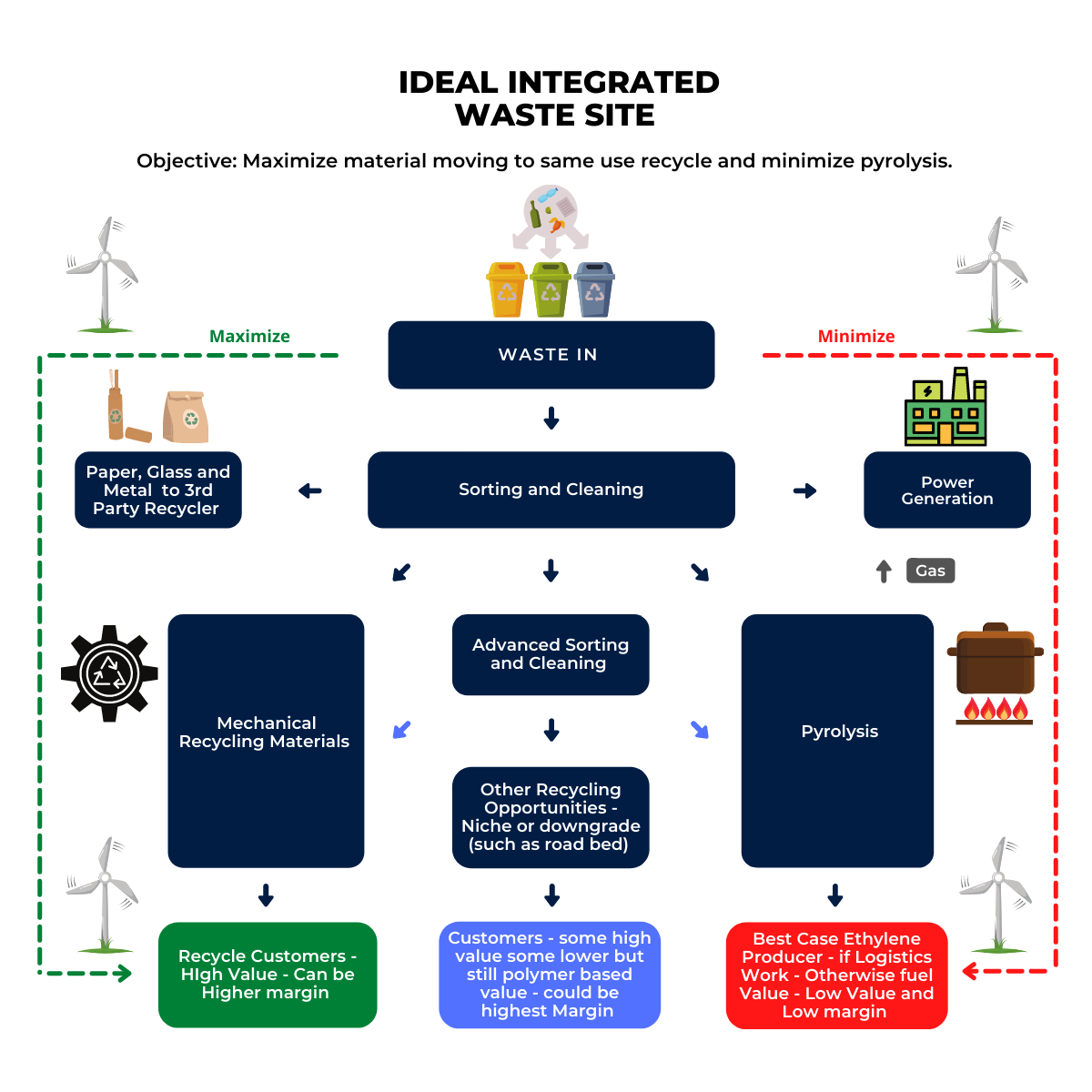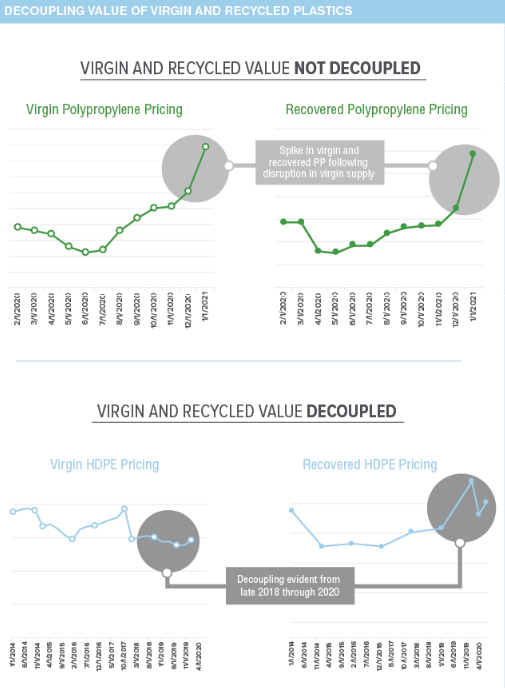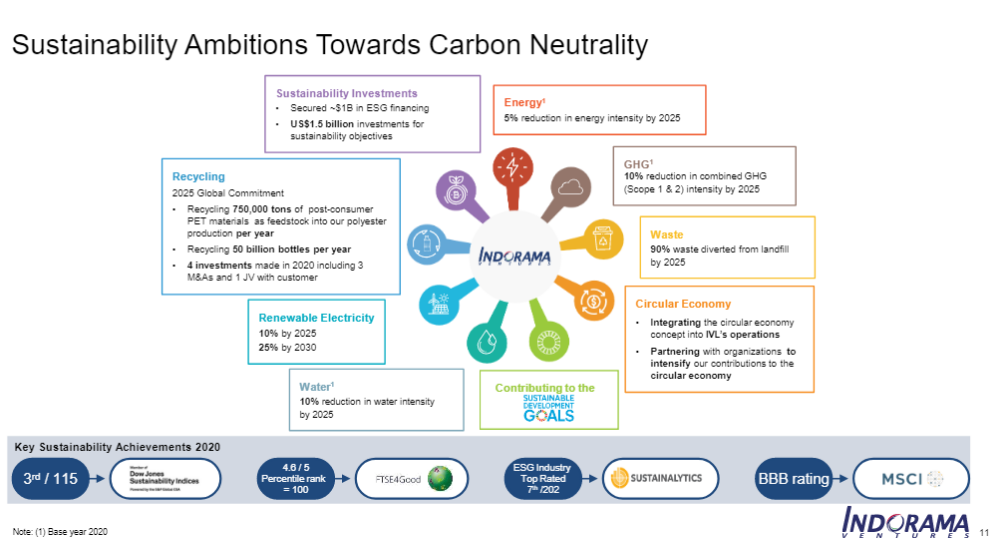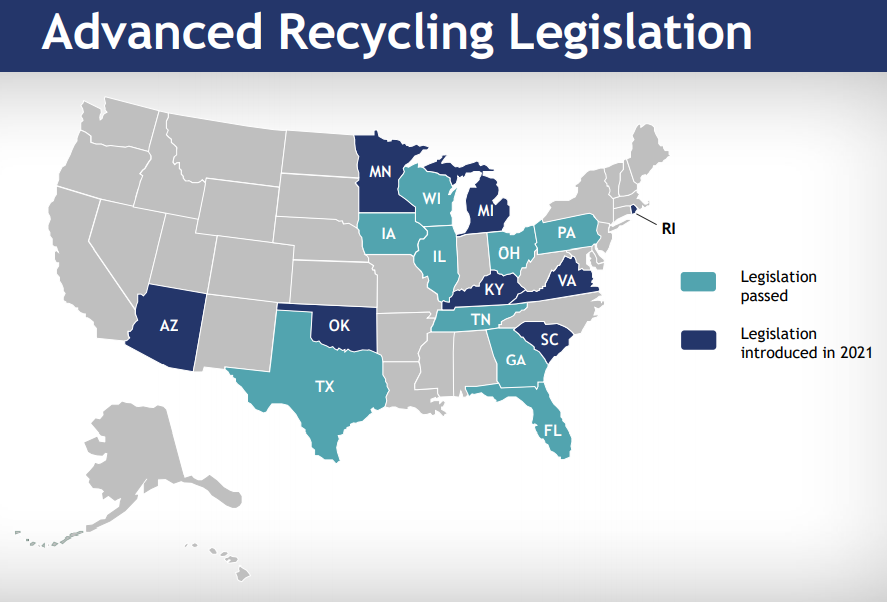The ACC call for 30% recycling of plastics by 2030 emphasizes chemical recycling, and in our ESG and Climate report yesterday we talked about an alternate path for plastics, one that focuses on reducing waste rather than increasing recycling. The product standardization and consumer and municipality waste collection and sorting rigor that would be needed to maximize mechanical recycling are significantly harder to achieve than the changes that would be needed to dramatically increase chemical recycling – i.e. it may be easier and less expensive to get to zero waste than it is to get to maximum recycling. Maybe we are thinking about this wrong, but to change tacks from here the industry would need to demonstrate that plastic waste can be removed, at scale, and then convince the plastic buyers that the path is better. We discuss the possibility in more depth in yesterday’s report.
Advanced Recycling: Have We Misjudged You?
Jul 15, 2021 1:26:31 PM / by Graham Copley posted in ESG, Recycling, Climate Change, Plastic Waste, Plastics, Mechanical Recycling, carbon footprint, carbon abatement, chemical recycling, zero waste
Recycling Confusion Continues: Brand Owners Could Struggle To Meet Goals
Jun 22, 2021 1:48:14 PM / by Graham Copley posted in ESG, Recycling, Sustainability, Plastic Waste, Plastics, Mechanical Recycling, carbon footprint, polymer producers, chemical recycling
We want to focus on the following headline as it is both relevant and confusing:
It Is Hard To Find Talent When All The Issues Are New
Jun 8, 2021 12:21:03 PM / by Graham Copley posted in Recycling, Climate Change, Sustainability, Net-Zero, fuel alternatives, carbon abatement, renewable polymers, investment managers, investor relations
The article linked that discusses the “Talent War” for ESG spreads well beyond the investment community. Corporations are having to rethink strategy around new variables, and consequently, the experienced talent pool is limited and in some areas such as carbon abatement, recycling versus renewable polymers, and alternate sources of fuel, there is not much history to have created many “experts”.
More Recycling News. Hopefully More Recycling Action
May 27, 2021 1:48:57 PM / by Graham Copley posted in Recycling, Polymers, Polyethylene, Polypropylene, Pyrolysis, Mechanical Recycling, LyondellBasell, Dow, unrecyclable polymer, sorting and cleaning, Nova, Closed Loop Partners, ethylene feed, PE
The Dow, LyondellBasell, Nova, Closed Loop Partners announcement yesterday is worth some thoughts. Closed Loop Partners is a PE company focused on funding recycling opportunities, but by its nature, it is relatively risk-averse as it has return goals to meet for its investors – to date its investments have been low-hanging fruit and niche in nature, but steps in the right direction nonetheless. The investment from the majors perhaps gives Closed Loop some wiggle room to look at projects that are less of a sure thing and maybe require a leap of faith on untested technologies or at least technologies untested at scale – primarily in sorting and identifying polymers and cleaning. We would still expect each project to be small, simply because access to the clean and easily sorted polyethylene and polypropylene in the US is limited by very poor standards of recycling and the vast proportion of unrecyclable polymer that ends up in a waste stream. If the group can find locations with significant supply, it might be wise to build pyrolysis at the same site to deal with everything that cannot be recycled. Our hope for this investment is that it is not simply an ESG PR opportunity for the polymer producers and that it does the following:
Packagers Are Looking At Renewable Sources As Recycle Availability Is Limited
May 20, 2021 2:17:33 PM / by Graham Copley posted in Recycling, Biofuels, Polymers, PET, packaging, Gevo, Supply Chain, Butanol, Coca-Cola, packaging materials, biogradable polymers, Renewable Sources, hydrocarbons
The coverage of the IEA study continues with lots of opinions, which is a good sign as it means that the work is being taken seriously.
Consistent Supply Of Recycled Plastics Will Require Consistent & High Enough Pricing
May 13, 2021 1:37:30 PM / by Graham Copley posted in Recycling, Polymers, Polyethylene, Plastics, Polypropylene, recycled polymer, polymer pricing, hydrocarbon prices, virgin resins, supply and demand, raw materials inflation, LyondellBasell, Suez, polymer buyers
We talked a little about recycled polymer pricing in our ESG and Climate report yesterday. Recycled polymer pricing is rising relative to virgin polymer pricing (see chart below) and is likely to continue to rise unless hydrocarbon prices push virgin resins materially higher. Demand for recycled polymer is growing quickly and more quickly than supply, and we expect this to be reflected in an increased premium, barring more raw material inflation. Recycling is a fixed cost business – each step has a well-understood cost and companies are innovating to try and lower the cost of each step, but as so many different stakeholders are in the chain, it is a complex problem. One of the reasons why see the LyondellBasell/Suez venture works in The Netherlands is because Suez controls the waste in a region where recycling compliance at the household level is high. Despite this, it has taken a couple of years to get to the volumes needed to make the venture adequately profitable – mostly ensuring enough pure recycled polyethylene and polypropylene makes it to the facility. If polymer buyers are willing to cover the full cost of recycling in terms of the prices they are willing to pay, more material will become available – if LyondellBasell/Suez can demonstrate that they can make money when all the stars are aligned, it will likely encourage them to work with other municipalities in other parts of Europe (first) to see if they can replicate what they are doing now. In our view, all of the other advertised recycling programs are very small, very focused on niche applications, and don’t move the needle.
Embracing Different Ways of Achieving Emission Goals
May 7, 2021 1:19:47 PM / by Graham Copley posted in Hydrogen, Carbon Capture, Recycling, CO2, Renewable Power, Emissions, Carbon Neutral
The headlines in today's daily report are interesting as they discuss a large number of different initiatives in recycling, carbon use, and capture, routes to hydrogen, etc. Each initiative is small, but the collective news is encouraging as it suggests that the mood might be changing from one which focuses on only a handful of tools to meet emission goals – which in turn are already helping to driven materials inflation - to a much broader approach that recognizes, or at least beings to recognize, that we need to try everything. We need to experiment with new approaches to recycling; we need more use for CO2 than simply pushing it all underground (but we must still push a lot underground), and we need to try multiple routes to hydrogen, not just those that need to consume vast amounts of renewable power. We need more partnerships – several listed this week - and we need government support where it can be most effective. The headlines today are far more heterogeneous, which is a good sign. One company's view of the solution is show in the chart below.
Pyrolysis Will Never Win If Consumers Are Willing To Pay For Recycled Plastics
Apr 30, 2021 1:46:22 PM / by Graham Copley posted in Recycling, Polymers, Plastic Waste, Plastics, Pyrolysis, Mechanical Recycling
Recycling is a fixed cost business – it does not vary with the price of oil or the price of natural gas – and the more willing potential customers are to pay on a fixed cost basis, to cover the collection, separation, cleaning, and re-pelletizing costs, the more recycled material will make it back into the cycle and not into landfill or pyrolysis. The pyrolysis technologies being discussed by the major polymer producers are a solution to the plastic WASTE problem, and they allow for a degree of recycling potentially, but they will never be able to bid waste polymer away from a mechanical recycling alternative if the buyer is willing to cover the costs. We have written extensively on these topics in our ESG and Climate reports and we would point readers back to Unwanted: Chemical Recycling – Necessary Now, Less So Later and the second section of True Blue: Not Green but Likely Good Enough.
Proper Recycle Labeling and a Boost for CCS
Apr 13, 2021 12:57:23 PM / by Graham Copley posted in ESG, Recycling, Plastics
Well done LyondellBasell, for one of the most sensible moves we have seen today concerning polymer labeling. The “Circulen” labeling will tell customers what they are getting and where it came from – mechanical recycling, chemical recycling, or a renewable feedstock. This should eventually lead to tiered pricing as customers, especially packagers try to solve for ambitious more sustainable packaging solutions that look very hard to achieve today.
Sequestration, Hydrogen, and Another Critique of "Advanced Recycling"
Apr 1, 2021 12:04:55 PM / by Graham Copley posted in ESG, Hydrogen, Recycling, Sequestration
We discussed CCS as a possible enabler for US LNG above and we have noted a substantial increase in stories around CCS plans, projects, etc. since the beginning of the year. But what is missing in the US are actual physical plans – CCS ventures are being formed, like the Aemetis headline below, but they signal intent rather than action. Renewable fuel companies should be very interested in CCS as they can claim the 45Q tax credit for the CO2 sequestered and they can lower the carbon intensity of their fuel by doing so, resulting in a higher LCFS credit also (they are additive). The challenge for many is that the renewable fuel projects are not large and they are often not in locations that have had substantial seismic work done to identify pore spaces. There is also the additional problem of land rights and potential royalty payments – as there would be with an oil or gas find. Most of those who would like to capture carbon and are making statements like the one below have no subsurface experience and will likely need to turn to one of the oil service companies for help.







